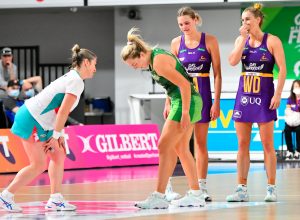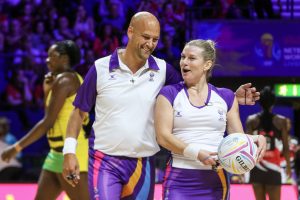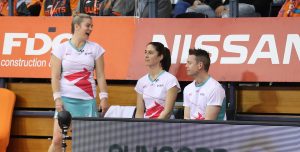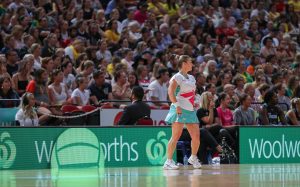
The credit belongs to the (wo)man who is actually in the arena, whose face is marred by dust and sweat and blood; who strives valiantly; who errs, who comes short again and again, because there is no effort without error and shortcoming; but who does actually strive to do the deeds; who knows great enthusiasms, the great devotions; who spends himself in a worthy cause. Theodore Roosevelt.
It’s perhaps an unusual word for an umpire, particularly in the heat of a contest, but Michelle Phippard is generous.
Generous with her time, advice, her insights and mentoring. In her desire for netball to grow and succeed, for conditions to improve for officials, and all who participate in the game. And so, in announcing her retirement, it’s no surprise that one of the netball world’s greatest umpires is more focused on those who’ve supported her along the way, and those who will follow her, rather than in her own prestigious career.
For over 20 years, Phippard has been on court, on our screens, and in control. She’s umpired almost 200 elite domestic games and presided over 112 international matches, including four Commonwealth Games, three Netball World Cups and one Netball World Youth Cup. She sits on World Netball’s Rules Panel, and is an International Testing Panel cadet. Her work behind the scenes is legendary, helping to drive new standards for athletes, coaches and teams.
At the peak of her ability, and with a fifth Commonwealth Games in reach, it might seem an unusual time to lay down her whistle, but Phippard has no regrets.
“I’ve had a more successful career than I ever dreamed of, it’s taken me to some amazing places, and I’m really grateful for the opportunities I’ve had, so it’s not a bad place to end.”
Michelle Phippard keeps a watchful eye on the action at the 2018 Commonwealth Games. Image Simon Leonard
Retirement
Unfortunately for Phippard, that end was forced. A medical diagnosis of rheumatoid arthritis, just a month ago, was the tipping point for factors that had already been hanging in the balance.
Thoughts of retirement had already been hovering, given the complexities of Covid, a thriving legal practice and a young family. Phippard said, “I’d really made the last two cycles a priority, and when you devote yourself to something you work very hard because you don’t want to walk away with regrets. I gave it the time and attention and effort it needed, and the results were pleasing.
“I’ve given so much of my life to umpiring, and it’s been a significant priority for me. I’ve never seen it as a sacrifice, but it has been for the people around me – my kids, my husband, and my mum who’s spent a lot of time supporting our family when the kids were younger. My priorities were definitely impacting them, and I was reaching a point where I couldn’t do it anymore.
“The Covid hub of 2020 was a turning point. In a cost analysis of what I could give time to, and what else is important to me – my kids are starting high school during a time of such uncertainty, and my work commitments are expanding. So I was starting to think of those things, and then physically it got hard.
Battling injuries and fatigue over the past few years – looking back they were part of her symptoms – made it difficult for Phippard to get out on court. She found that previously effortless speed tests, a key testing point for umpires, had become difficult, and injury after injury followed. Sleep was disrupted by painful flare-ups, and fatigue dogged her.
“I’d train like crazy, then something would flare up – it was two steps forward and two steps back each time – and it’s taken a while to get to the bottom of it. As an athlete, it’s put down to overtraining, or needing to have a rest. I’d been in and out of hospital, but it wasn’t until December last year when I had a major flare up, and my knees ballooned, that blood tests were finally able to identify what the problem was.
With many of her symptoms initially ruled to be age-related, a definitive diagnosis took some time. Phippard said, “When you are a fit and healthy-looking person, people can be dismissive of your concerns, and you don’t realise how unwell you’ve been until you start to feel better. I just put it down to getting older, or being busy.
Rheumatoid arthritis, which almost 2% of Australians live with, is a disease that impacts many body organs, but is particularly destructive on joints. While it mainly impacts older people, those with an earlier onset have to be careful managing their long term quality of life.
“It’s a relief to have a diagnosis now, although we still need to get it under control,” explained Phippard. “Medications will help, but I already have creaky netball knees, and this disease attacks the lining of your joints. I need to play the long game here, thinking of the years ahead, and the amount of high impact work involved in umpiring at this level isn’t compatible with that.
“As a busy and motivated person it’s hard to take things off your plate, or to ask for help. You’re used to thinking of yourself as bulletproof, and it was hard to accept there were things I couldn’t do, and to adjust my expectations of myself.
“So there’s been some tears and a little bit of a struggle because it’s hard to let go of something you love so much, but I feel good about my decision now.”

Michelle Phippard notched up her 100th international at the 2018 Commonwealth Games. Images Simon Leonard
Development
From the start of her career, Phippard made it a practice of umpiring at training sessions on a voluntary basis, from underage state and national teams to open and Australian teams, and club franchises. The effort not only honed her skills, but helped coaches and players improve on theirs. Phippard particularly enjoyed the collaborative approach employed by coaches such as Lisa Alexander, who she rates as hugely influential on her career.
Growing up in Victorian and Australian ranks together, Alexander saw first-hand Phippard’s impact on netball. “She has such reverence for the game, and she wants it to operate at the highest level.
“So she’s worked with coaches to improve herself, but also to help coaches understand the rules, and how their players are working on the court. She’s been at the forefront of that, and it would all be done in her own time.
“I always trusted her, and she always trusted me to give her feedback about what I felt was happening on court.”
Across the course of her career, Phippard has been uniquely herself – fair and objective on court, approachable, with a thorough knowledge of the game, and a definite sense of humour. Those lessons came from her biggest mentor, former Australian Director of Umpiring Chris Burton.
Phippard said, “I was in awe of the command she had of the game, her depth of understanding, and the way she communicated with players. She really instilled in me that everything an umpire does is tied to the concept of enhancing the contest, and that’s been a guiding principle for me – the desire to go out there and help make the game better through my involvement.
“She had so much flair too, and that’s important for an umpire. Not to copy other people or fit into a mould, but to bring yourself to the game, and I hope that I’ve been able to be authentic.”
Another of Phippard’s key skills has been communication, something she developed while working closely with another mentor, Joyce Brown, doyen of Australian netball. The pair first met at Melbourne Phoenix in the late 1990s, in an environment that few umpires dared to enter. “I was utterly intimidated but also ecstatic – her trainings were the stuff of legends because she was quite brutal at times,” said Phippard.
“It was terrifying having this voice boom at you from the other end of the court, asking what you’d just done. It was challenging but extremely formative, in learning to make decisions, and explaining why you’d made them. As umpires, it kept us honest!”

There were a few on court giggles as Michelle Phippard made a blood ruling. Suncorp Super Netball, 2020. Image Simon Leonard
The athletes
Starting elite umpiring at a time when there were some big personalities on court – Michelle den Dekker, Vicki Wilson and Kathryn Harby among them – Phippard said, “They were incredible in terms of their skill but also were very crafty and kept me on my toes. So having that weekly environment with Joyce, knowing I was going to be tested, helped me to thrive at that level and continue to progress.
“Umpiring is about great communication – clarity and consistency helps you to build a rapport, and develop a relationship and mutual respect with players out on court. It makes their experience so much better, no matter what level they play at.
“I enjoy the fact that players feel they can ask me a question, and I can try to give them some information during the match and more at a break. While part of our job is to enforce the rules correctly, it’s also to educate – and so athletes stay in play more, and umpires don’t have to blow the whistle as often.”
Former Vixens captain and Australian representative, Bianca Chatfield, grew to know Phippard well, particularly as umpires used to travel with teams. She said, “You’d really get to know them, and that helped to build not only a level of trust and respect, but an understanding of their professionalism. There were so many times at training, when Michelle would be trying to help me work out what to do on court to make a difference.
“I remember one year when I was heavily penalised for obstruction, and I thought I’d make a point of getting my three feet, putting my hands up, then looking at Michelle and asking her if it was okay.
“The first few times she giggled, but I did it all game, and really pushed the boundaries. At the end of the game, she pulled me aside, and told me I couldn’t do that and she’d ignore it from now on. I just thought I was being hilarious, but I could have got in a lot of trouble for it, and really appreciated the quiet manner in which she handled it.”
Together with being a good communicator, one of the most underrated qualities for an umpire is to build a level of trust with players and coaches – something that Phippard has been widely respected for. Teams need to know that they will be umpired fairly, professionally and safely, allowing their full athleticism to be on display during a game.
Phippard said, “You can sense it when you walk onto court, when players have a degree of confidence in you and your decision making. They might not always agree with you, but they know where they stand, and that can’t be underestimated. You don’t just build that on game day, it happens behind the scenes, as players know that you put in the work to understand what they do.
A regular at domestic and national level training sessions, Phippard has influenced several generations of athletes. She said, “Many players aren’t used to working so closely with umpires – Serena Guthrie is a great example. I didn’t know her well when she came to the GIANTS, but by the end of her time we would have great discussions about things she was being penalised for, or that she wasn’t sure of.
“When you are watching players later, that’s very rewarding, and you think, ‘That’s what I mean!’ Their adjustment to stay in play and not infringe. It gives me a lot of joy to think I might have contributed to that.”

Michelle Phippard’s incisive ability to control a game with consistency and clarity has been admired by all. Gary Burgess describes it as ‘the lawyer and mother coming out in her!’ 2019 Netball World Cup. Image Danny Dalton
Fellow umpires
International Umpire Assessor Gary Burgess is another who believes that trust is an underrated virtue, but one that epitomises his professional relationship with Phippard. They first met when Phippard lived in Switzerland, working at the English SuperLeague in its formative years, and at Netball Europe matches. Qualified to adjudicate at an international level, the pair have known each other for more than 20 years.
“It’s more common now,” said Burgess, “but it used to be rare that you’d be opposite someone that you’d trust implicitly. She always had my back, and applied the same interpretations as I did, which added to the spectacle of the game.
“I remember when I took a tumble in the opening game of the 2019 Netball World Cup – she was on the other side of the court at the time, and gave me a big laugh. Not against me, but laughing with me.”
“And while Michelle can let her hair down after a series – what goes on tour, stays on tour – her attention to detail is amazing, really laser sharp, while the work she also does with emerging talent and emerging umpires has been outstanding.”

A light hearted moment between Gary Burgess and Michelle Phippard, umpiring at the 2019 Netball World Cup. Burgess described their working relationship as being ‘mutual body-guardesque – we always had each other’s backs.’ Image Danny Dalton
Lighter moments
Umpires quickly learn to expect the unexpected, and for Phippard, it’s led to many light-hearted memories. On her first overseas tour, an Australian Institute of Sport side headed to Fiji to play their national team. The combination of humidity, and courts that were just a dangerously thin layer of vinyl over concrete, led to some safety concerns.
“The AIS girls had their lycra bodysuits on – they were drenched in sweat and dripping all over the court. It was like a skating rink, and I was worried someone was going to break a leg. So I kept stopping play to mop the court, and lots of people were telling me I couldn’t.
“And while I kept checking the court and trying to umpire at the same time, Vili Davu, the Fijian captain and goal keeper, went up for a rebound. She passed it off before she landed, and as I ran out of defence I heard this voice behind me, saying, ‘Michelle, I’m really sorry!’ She’d bumped into the goal post afterwards, and completely upended it. It was one of those games when anything that could’ve happened, did.”
Sitting with commentators listening to crowds sing during power outages, sandbags propping up goal posts and dribbling grit everywhere, incorrectly sized netball courts, being police-escorted through traffic while dodging anything from goats to buses, Phippard has just about seen it all. She’s developed a healthy sense of humour, along with a strong understanding of procedures and protocols should the unforeseen happen.
It was never more needed than during a now infamous incident. Before a Quad Series match in South Africa, Phippard noticed Phumza Maweni warming up with a towel around her shoulders. When she asked why, she got told, ‘Birds, Michelle, birds!’
“I didn’t think too much of it, but the stadium roof was open, and during the game Laura Malcolm (England player) came over and asked me to hold time. When I asked her why, she said, ‘A bird shat on me!’
“I said, ‘What??’
“She turned around, and sure enough there was bird poo all down her shoulders. So we held time, and in the end I decided it was an emergency, because being shat on by a bird isn’t actually an injury. You do learn to think on your feet.”

Michelle Phippard has always enjoyed the relationships she’s built with athletes, coaches and other officials. Pictured during the Suncorp Super Netball, 2019. Image May Bailey
A vision for the future
Conditions for umpires have come a long way since Phippard first started, although she believes there is progress still to be made, with Covid increasing the difficulty level. “We are effectively part time athletes with full time jobs, and that led to particular demands on people,” she explained.
“Expectations on umpires are huge. Not just externally in getting decisions right, but being able to put in the training – physical, technical and analysis – and supplementary things like psychology and well being, which all take their toll.
“We do have bad games, we make a few bad decisions and they aren’t always easy to recover from particularly if they are at a critical point in the game and could have impacted the result. To really push umpiring forwards beyond the scope of a part time job is a challenge.”
Phippard’s breadth of knowledge is invaluable, and fortunately she won’t be lost to the game. While there are her medical issues to sort out, she hopes to continue with her existing World Netball commitments, and is keen to see where further opportunities might lie.
“It’s been a big part of who I am for so long, and I’ll always have a place for it in my life. I’m looking forward to seeing what off-court roles are out there, even things like doing some analysis and possibly even being an umpire in the netball media space, and what that could look like.”
Having adopted Theodore Roosevelt’s level of commitment to a ‘worthy cause’, Phippard will undoubtedly bring the same efforts and professionalism to the next phase of her netball career. For as that politician once stated, ‘Who at the best knows in the end the triumph of high achievement, and who at the worst, if he fails, at least fails while daring greatly.’
For all those who’ve worked with Phippard, and a legion of admiring fans, her presence on court will be greatly missed. And while we watch and wait to see what comes next, it’s time to say to this netball great – thank you, Michelle.

In announcing her retirement, Michelle Phippard has no regrets. Pictured at the 2020 Bushfire Relief Game. Image May Bailey
